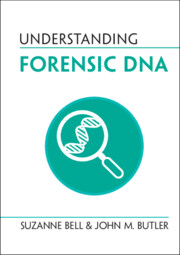Book contents
- Understanding Forensic DNA
- Understanding Life
- Understanding Forensic DNA
- Copyright page
- Reviews
- Dedication
- Contents
- Foreword
- Preface
- Acknowledgments
- 1 Biological Identification
- 2 Before DNA
- 3 First-Generation Forensic DNA
- 4 STR Methods and Loci
- 5 DNA Analysis and Interpretation: Single-Source Samples and Simple Mixtures
- 6 The Curse of Sensitivity
- 7 From Mothers and Fathers
- 8 Emerging Technologies
- 9 Emerging Issues
- Concluding Remarks
- Summary of Common Misunderstandings
- References and Further Reading
- Figure Credits
- Index
Concluding Remarks
Published online by Cambridge University Press: 02 September 2022
- Understanding Forensic DNA
- Understanding Life
- Understanding Forensic DNA
- Copyright page
- Reviews
- Dedication
- Contents
- Foreword
- Preface
- Acknowledgments
- 1 Biological Identification
- 2 Before DNA
- 3 First-Generation Forensic DNA
- 4 STR Methods and Loci
- 5 DNA Analysis and Interpretation: Single-Source Samples and Simple Mixtures
- 6 The Curse of Sensitivity
- 7 From Mothers and Fathers
- 8 Emerging Technologies
- 9 Emerging Issues
- Concluding Remarks
- Summary of Common Misunderstandings
- References and Further Reading
- Figure Credits
- Index
Summary
We have come a long way in a short time. From the first use of DNA typing for a criminal investigation in 1986 to now, over 35 years have passed. Those years have brought a revolutionary change in human identification, from ABO blood typing to analysis of complex mixtures, probabilistic genotyping software, and investigative genetic genealogy. Forensic DNA typing now applies to STRs (still the primary method), Y-STRs, mitochondrial DNA, and SNPs. We have law enforcement databases and consumer databases that are used in current and cold cases. We have seen how portable DNA instruments can be used in mass fatalities and police booking stations.
There are several key takeaways from this journey, including the need to correct several common misunderstandings, as summarized in the next section.
- Type
- Chapter
- Information
- Understanding Forensic DNA , pp. 155Publisher: Cambridge University PressPrint publication year: 2022



